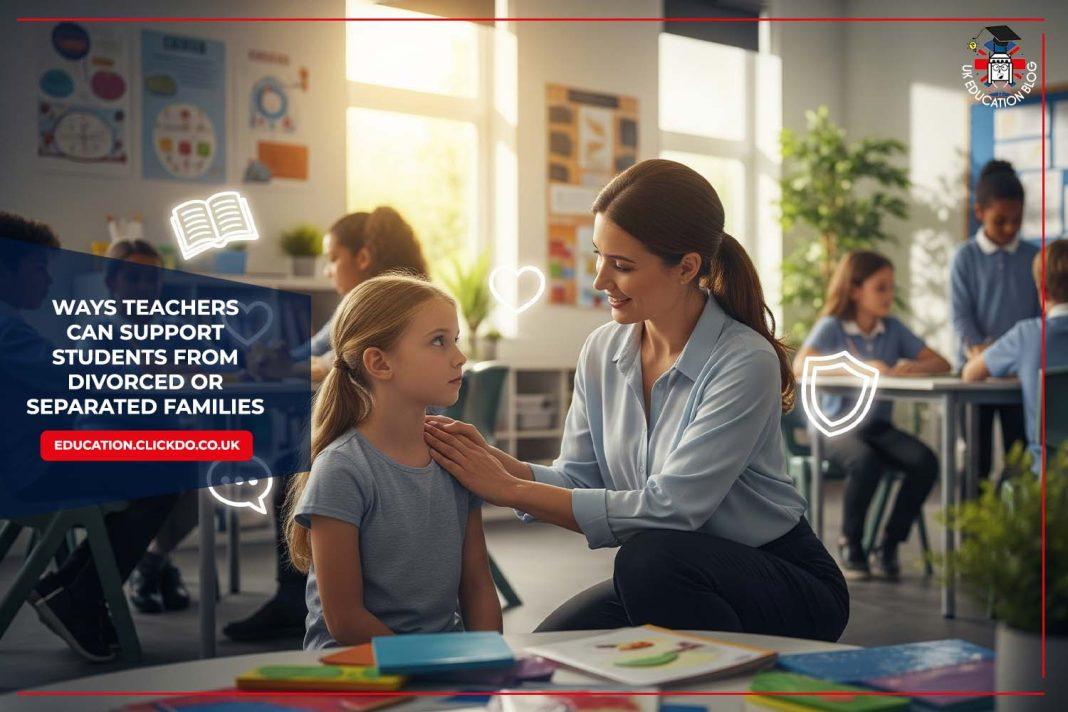Divorce and separation affect more than just parents—they have a profound impact on children, too.
Teachers are often the first to notice changes in a child’s behaviour, concentration, or confidence when family circumstances shift.
With school being a safe and structured environment, teachers play a crucial role in supporting pupils through this difficult period.
In this blog post, our experts will explore five key ways teachers can support pupils from divorced or separated families, helping them feel safe, understood, and able to succeed academically and socially.
1. Create a Safe Space for Expression

Children experiencing divorce often carry emotional burdens into the classroom. They may feel anxious, angry, or withdrawn. Teachers can help by creating a safe, non-judgmental environment where children feel comfortable expressing themselves. This doesn’t mean putting them on the spot, but rather being available for conversations when they are ready.
Providing journals for private writing, encouraging creative projects, or having a trusted pastoral lead can help children process their emotions in a healthy way.
It’s also important to remember that expression can take many forms. Some children may prefer drawing, sports, or music as ways of communicating their feelings. By offering varied outlets, teachers can help each child find a way that works for them, also at home.
To support families navigating these separations, seeking help from family law solicitors London can ensure that practical arrangements such as custody, financial support, and parental agreements are handled with clarity, allowing children to benefit from consistency both at home and at school.
2. Maintain Consistency and Routine
Divorce often brings disruption at home, with changes in living arrangements, routines, and even friendships if a family relocates. Teachers can counterbalance this instability by maintaining consistent expectations in the classroom. Keeping routines predictable helps children feel secure and reduces anxiety.
Small gestures like keeping to the same schedule, being consistent with homework expectations, or reinforcing classroom rules give children a sense of stability. The NSPCC highlights that consistency is one of the most valuable things adults can offer children during times of change.
Consistency also extends to emotional responses. Children benefit when teachers react predictably to both positive and negative behaviour. This reassurance helps them trust that school is a stable environment even when home life feels uncertain.
3. Communicate With Sensitivity

Children from divorced families may feel embarrassed, isolated, or reluctant to talk about their situation. Teachers should use language that is sensitive and inclusive. Avoid assumptions about family life and be mindful when planning activities that traditionally involve parents, such as Father’s Day or Mother’s Day crafts.
It is also important to communicate effectively with both parents, if appropriate. Neutral, respectful communication about the child’s progress helps avoid tension and keeps the focus on the pupil’s well-being. Guidance from the Education Endowment Foundation stresses the importance of communication that appeals to the child.
Sensitivity also means being discreet. Children may not want their peers to know about their family circumstances. Respecting confidentiality and avoiding unnecessary questions in front of classmates helps protect their dignity and self-esteem.
4. Offer Additional Academic and Emotional Support
Divorce can impact concentration, leading to dips in academic performance. Teachers should be alert to signs of struggle and offer additional support where possible. This might mean providing extra help with homework, offering tutoring, or adjusting expectations temporarily.
Equally, emotional support is just as important. Having a designated mentor, access to a school counsellor, or simply regular check-ins with a trusted teacher can make a huge difference. Schools that implement pastoral care programmes often find children are more resilient and better able to focus on their learning.
Where resources allow, teachers can also work with school psychologists or special educational needs coordinators to create tailored support plans. This holistic approach ensures that both academic and emotional needs are being met.
5. Encourage Positive Peer Relationships

Friendships are a vital support system for children going through divorce. Teachers can help by encouraging inclusive activities and addressing bullying or isolation quickly. Group projects, team sports, and creative activities can foster peer support and give children the reassurance that they are not alone.
It is also helpful to gently educate classmates about empathy and kindness without singling out any individual pupil. Promoting a culture of understanding benefits all students and creates a healthier, more supportive school community.
Teachers should also encourage pupils to explore extracurricular activities. Clubs and groups can provide safe spaces where children make friends outside the immediate classroom, broadening their support networks.
Teachers as Anchors of Stability
While teachers cannot resolve the challenges of divorce, they can play a powerful role in helping children feel safe, valued, and supported. By creating safe spaces, maintaining routines, communicating sensitively, offering support, and fostering positive peer relationships, teachers can give children the tools to thrive despite family difficulties.
For families going through divorce, professional legal guidance is just as important as emotional and academic support. Working with solicitors ensures that children’s best interests are prioritised, giving them the consistency and care they need to flourish both inside and outside the classroom.
Ultimately, when teachers balance empathy with structure, they act as anchors of stability in children’s lives. This grounding influence can make a lifelong difference in how pupils cope with family changes and build resilience for the future.
This blog is intended for general informational purposes only and does not constitute legal advice. For advice specific to your family situation, consult a qualified legal professional experienced in family law.
Author Profile

- Shirley Owen is a blogger and writer who enjoys writing blogs on education, technology and general news. An avid reader, she follows all the latest news & developments to report on them through her articles.
Latest entries
 learningDecember 22, 2025When Co-parenting Affects School Performance – Challenges & Solutions
learningDecember 22, 2025When Co-parenting Affects School Performance – Challenges & Solutions educationDecember 11, 2025Making Education Accessible for Mobile Families that Travel
educationDecember 11, 2025Making Education Accessible for Mobile Families that Travel learningOctober 28, 20257 Daily Classroom Strategies Helping Children With Learning Differences Thrive
learningOctober 28, 20257 Daily Classroom Strategies Helping Children With Learning Differences Thrive  educationSeptember 18, 2025A Guide to the European Accessibility Act for Schools and Universities
educationSeptember 18, 2025A Guide to the European Accessibility Act for Schools and Universities







